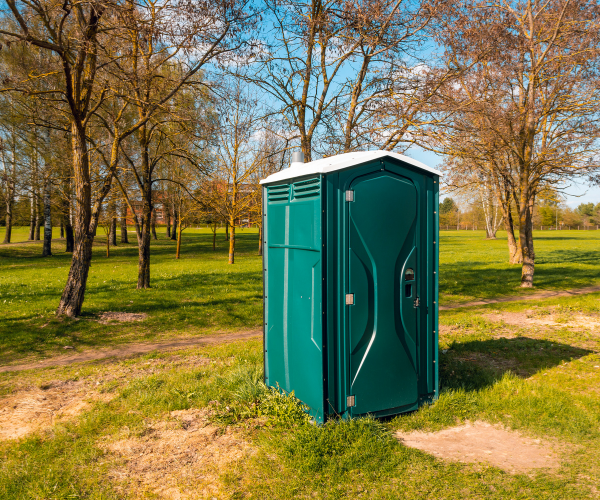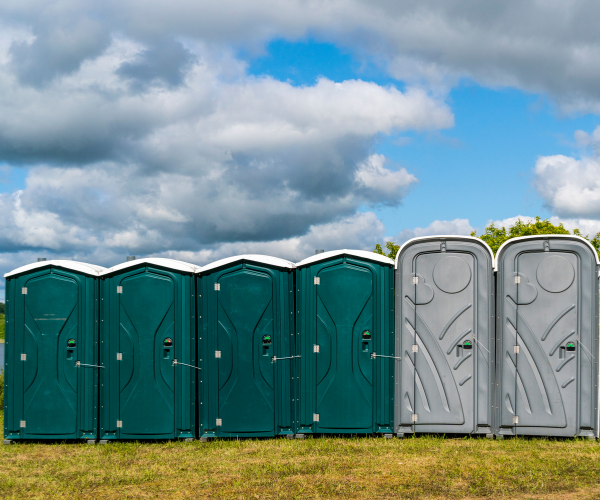Using portable toilets offers numerous eco-friendly benefits, which are particularly appealing in today's environmentally conscious society. Firstly, portable toilets help conserve water by using significantly less than traditional indoor plumbing. A standard toilet can consume between 1.6 to 7 gallons per flush, while a portable toilet uses only a few ounces, thanks to its chemical-based waste treatment system. This means they minimize water waste considerably and are beneficial in areas where water is scarce.Additionally, many portable toilet companies use environmentally friendly chemicals for waste breakdown and odor control, meaning fewer harmful substances degrade the soil and water upon disposal. By employing advanced deodorizing solutions that work effectively without leaving a detrimental environmental footprint, these toilets provide an alternative that's both efficient and sustainable.Another advantage is their ability to be strategically placed in locations that reduce environmental impact, which is beneficial for large outdoor events held in environmentally sensitive areas. Installing restrooms in areas with sensitive eco-systems without the need for extensive piping reduces land disruption and keeps natural habitats intact.Moreover, the construction and operational characteristics of modern portable toilets reflect an increasing trend toward sustainability. Newer models are designed using recyclable materials, and once they reach the end of their practical life, many components can be recycled, minimizing waste. Additionally, modern restrooms have features that improve air quality, including better sealing and ventilation options, which holds significance in reducing airborne pollutants. Finally, the convenience of portable toilets lowers the demand for permanent structures that normally require extensive resources to build and maintain, thus limiting long-term environmental damage. By offering a removable, non-permanent solution, they offer the flexibility required for balancing human needs with environmental conservation.

Portable Toilet Rentals in Peoria, Arizona
Call today for a free quote (602) 353-7526
Portable Toilet
Fast, Easy, & 100% Free To Get Started
Decades of Expertise
For over 20 years in Peoria, our portable toilet company has fostered strong community ties, offering exceptional service with a commitment to quality and customer satisfaction. Rely on us for dependable solutions tailored to your requirements.
Unmatched Quality Service
Our dedication to quality shines through in every service we provide. From setup to maintenance, we ensure that each portable toilet meets the highest standards of cleanliness and functionality, offering our clients peace of mind for their events.
Swift and Efficient Delivery
We pride ourselves on our ability to deliver portable toilets quickly and efficiently. Whether your event is large or small, you can expect timely delivery and setup, allowing you to focus on what truly matters.
Reliable Portable Toilet Services in Peoria, Arizona
Call for a Free Quote Today
(602) 353-7526
At our locally owned portable toilet company in Peoria, we pride ourselves on being dependable and reliable service providers. With a strong presence in Peoria and surrounding areas, we have built a reputation for excellence in servicing construction sites, parties, festivals, and weddings. Our commitment to quality ensures that each unit is meticulously maintained and delivered on time. Customers trust us for our professionalism, and we stand by our promise of a hassle-free experience from start to finish. Whether for a bustling festival or an intimate wedding, we cater to your needs promptly and efficiently. Choose us for exceptional service backed by years of dedication to our community.


Our standard porta john rental units are durable and reliable for any commercial build site, housing development, public works project, or remodel job.Features include dome lighting, grated floors, and an “In-Use” locking mechanism for privacy and comfort. Regularly maintained, inspected, and cleaned by FusionSite at your location.

Developed as an alternative to full ADA-compliant restrooms, the Liberty is a spacious, wheelchair-accessible unit that can also be promoted as a family-sized restroom. Includes a patented flat-floor system for easy wheelchair access and maneuverability.Handrails, paper holder, and rotary latch are designed for simple, intuitive end-user operation.

Portable hand washing stations are essential for keeping your work site sanitary and clean. Features hands-free foot pumps, liquid soap, and paper towels.Perfect for job sites without water hookups, these units can handle hundreds of washes between services.
We Proudly Serve
Standard Portable Toilets
Rent-A-Can provides clean, reliable standard portable toilets throughout Arizona, ensuring comfort for any event or worksite.
High Rise Portable Toilets
Our Peoria-based Rent-A-Can offers high-rise portable toilets designed for contracting convenience in towering developments.
Restroom Trailers
Rent-A-Can's Peoria restroom trailers offer the ultimate in portable luxury and ease for special occasions and outdoor events.
Roll off Dumpsters
Peoria's Rent-A-Can specializes in roll off dumpster rentals, offering practical waste management solutions for various projects.
Septic Tank Cleaning
Rent-A-Can delivers outstanding septic tank cleaning services across Arizona, maintaining hygiene and efficiency every time.
Grease Trap Cleaning
In Peoria, Arizona, Rent-A-Can offers effective grease trap cleaning solutions to maintain kitchen efficiency and sanitation.
Fencing & Barricades
Rent-A-Can's Arizona-based fencing and barricades services ensure safe and secure site perimeters for events and projects.
Residential Storage
Peoria's top choice for residential storage by Rent-A-Can provides secure and accessible solutions across Arizona.
Peoria Portable Solutions
Getting a quote and arranging delivery for a portable toilet has never been easier in Peoria. We prioritize convenience, understanding the importance of providing quick and efficient service to our clients. Our website allows you to obtain a quote simply by completing a brief form, where you'll provide details such as the location and duration of your event or project. With the click of a button, you can also reach out to us directly for personalized service, ensuring that your needs are met promptly. Our delivery process is streamlined to minimize any inconvenience, as our team of professionals ensures that your portable toilet is set up exactly where needed, at a time that suits you best. We pride ourselves on adapting to our customers' schedules, making the entire process seamless. Whether for a construction site or a wedding, trust us to provide the portable toilets you need, when you need them, without any hassle.

Peoria is a city celebrated for its charm, scenic beauty, and vibrant community spirit, making it ideal for events year-round. With our portable toilets, visitors to Peoria's outdoor attractions and community gatherings can expect top-quality, spotless restroom facilities. Whether it's enjoying a game at the Peoria Sports Complex or taking part in the Peoria Arts & Cultural Festival, our units enhance the guest experience, adding to the city's abundant appeal. Choosing our services in Peoria means opting for convenience and reliability. Amidst the city's nature-filled landscapes and lively community events, we offer superior sanitation solutions tailored to meet the needs of any occasion. Our dedication to providing clean, dependable, and accessible portable toilets perfectly aligns with Peoria's commitment to hospitality. Our units not only integrate seamlessly with the surroundings but also ensure all guests enjoy a comfortable and enjoyable experience.
Why is our portable toilet service the best choice in Peoria? Our unwavering dedication to customer satisfaction distinguishes us from the competition. By focusing on local appeal and understanding what Peoria residents truly need, we offer tailored solutions for both small-town gatherings and large events. Our top-of-the-line units are maintained to the highest cleanliness standards, reassuring event organizers and guests alike. We are committed to not only providing portable toilets but enhancing Peoria's event experiences with our reliable services. Whether situated in a scenic park or an urban area, our units offer convenience, privacy, and hygiene, backed by a service team that knows the area inside out. Our goal is to contribute positively to every event we are part of, ensuring all restroom needs are met to the highest satisfaction level.
Our company prides itself on delivering fast and reliable portable toilet services in Peoria. We understand that timely delivery is crucial, whether it's for a last-minute event or a planned large-scale project. Our efficient team ensures that each unit is transported and set up quickly, focusing on providing the best experience possible. By utilizing a fleet of well-maintained vehicles and trained professionals, we guarantee your portable toilet will arrive on time, every time. We handle the logistics so you can concentrate on hosting your event. Our commitment to reliability means that you can trust us to meet tight schedules and urgent requests while maintaining the same level of quality and professionalism across all deliveries.
Explore Our Portable Toilets in Peoria
Renting a portable toilet in Peoria is a straightforward process with our streamlined service options. We offer a variety of ways to ensure you get what you need efficiently. To start, visit our website where you will find forms located at both the top and bottom of the page that make it easy to provide required rental information. The form itself is simple to fill out, asking only for your first name, last name, phone number, and email address.Look for the 'Get a Quote' buttons that are conveniently placed throughout our site pages. Clicking one of these will guide you to complete the necessary information to receive a prompt quotation. The system has been designed to optimize your time by providing quick responses while ensuring that your request is handled by our expert team members promptly.In addition to our online system, you can engage directly with our customer service representatives. Whether you prefer a phone call, an email, or an in-person visit, each option ensures personalized attention to address your specific needs, delivery schedules, and any specific customization you might require for your event or construction project.Rest assured, our dedicated team is available to assist at every step of the rental process. Whether it's determining the type of unit required, additional features, or calculating the number of units needed for a particular event's headcount, our goal is to align our solutions with your requirements, ensuring complete satisfaction.Our agility to anticipate busy schedules, sudden increases in demand, assistance with layouts, and strategic planning ensures you have the best possible experience when renting portable toilets in Peoria.
The typical delivery timeframe for portable toilet orders is designed to meet the needs of our clients efficiently, ensuring convenience and reliability. Upon confirming your order with us, you can expect immediate attention as we process requests in real time. Our team is trained to plan and execute deliveries promptly, acknowledging the urgency that often accompanies such rentals.For standard orders placed during workdays, we can generally arrange delivery within 24 to 48 hours, depending on the proximity of your location to our headquarters and the specific season. Our large inventory and network enable us to respond faster during busy periods and accommodate same-day deliveries when circumstances require. For instance, urgent requests related to special events or emergencies are prioritized through our operational framework.We ensure your rental is accompanied by proper logistics management, optimizing routes and schedules to reduce turnaround time and ensure our services add minimal disruption to your plans. The specifics of each order, including location, unit type, and quantity, are meticulously coordinated, enabling us to fulfill timely delivery.Moreover, communication remains key, and our staff will keep you informed from the moment your order is placed until it is completed. You will receive notification with estimated times and any necessary updates, ensuring there are no unexpected delays. We pride ourselves on transparency, which means proactive management of timeframes is standard.Ultimately, the objective is to provide you with an exemplary rental experience by delivering not just products, but also peace of mind with knowledgeable staff that addresses any of your logistical concerns efficiently.
Yes, we are able to service any type of event or construction service. Our capabilities extend to all kinds of events such as festivals and sporting events, and we excel at providing sanitation solutions for weddings, corporate events, family reunions, and any other special gatherings. Our diverse range of services accommodates any request size and type, ensuring an optimal outdoor sanitation experience.We are renowned for offering luxury restroom trailers and porta potties designed to suit different event themes and crowd sizes. This flexibility ensures that guests enjoy comfortable facilities tailored to their preferences. Furthermore, our roll-off dumpsters, fencing and barricades, and additional amenities like holding tanks, ADA units, portable sinks, and hand sanitizer stations complete the comprehensive range of sanitary support.By partnering with us, you can be assured of a seamless experience backed by industry expertise and state-of-the-art equipment tailored to Portland's unique requirements. Our dedicated team works closely from the planning stages, ensuring that logistics, compliance, and customer preferences are managed proficiently, lending peace of mind and reliability to event managers and site operators.Our established relationships and partnerships within the event and construction sectors in Portland offer distinct advantages. This local insight enables us to anticipate your needs and execute flawlessly in varying terrain, from urban complexes to remote sites, while providing premium products and services.Indulge in world-class support from a company that places your satisfaction as paramount. Our priority is to provide solutions seamlessly integrated into your event execution or project lifecycle, ensuring that attendees or workers enjoy the utmost comfort and facilities suited to their needs.

